Effective study habits are crucial for academic success and lifelong learning. Here are some simple yet powerful techniques to help transform your child’s study habits and boost their performance.
- Establish a Consistent Study Routine
- Set Specific Times: Allocate specific times each day for studying to create a routine.
- Consistency: Stick to the schedule to make studying a habitual part of your child’s daily routine.
- Balanced Schedule: Ensure the schedule includes time for breaks, physical activities, and relaxation.
- Create a Distraction-Free Study Environment
- Quiet Space: Choose a quiet area free from distractions like TV and loud noises.
- Organized Space: Keep the study area tidy and organized with all necessary supplies within reach.
- Comfortable Setup: Ensure that the chair and desk are ergonomically suitable to support good posture and comfort.
- Set Clear and Achievable Goals
- Short-Term Goals: Break down larger tasks into smaller, manageable goals to make them less overwhelming.
- Long-Term Goals: Help your child set long-term academic goals to give them a sense of purpose and direction.
- Track Progress: Use a planner or a chart to track progress and celebrate achievements.
- Use Active Learning Techniques
- Summarization: Encourage your child to summarize what they’ve learned in their own words.
- Teach Back: Have your child teach the material to you or a study buddy.
- Mind Maps and Diagrams: Use mind maps and diagrams to visualize connections between concepts.
- Incorporate Different Learning Styles
- Visual Learners: Use charts, graphs, and visual aids.
- Auditory Learners: Encourage reading aloud and discussing topics.
- Kinesthetic Learners: Include hands-on activities and movement-based learning.
- Encourage Regular Breaks
- Pomodoro Technique: Use the Pomodoro Technique, which involves studying for 25 minutes followed by a 5-minute break.
- Physical Activity: Encourage short physical activities like stretching or walking during breaks.
- Relaxation: Include relaxation activities like deep breathing or listening to music.
- Foster a Positive Attitude
- Praise Efforts: Focus on praising your child’s efforts rather than just their results.
- Growth Mindset: Encourage a growth mindset by emphasizing that abilities can be developed through dedication and hard work.
- Positive Reinforcement: Use rewards and incentives to motivate your child.
- Utilize Technology Wisely
- Educational Apps: Use apps designed to make learning interactive and fun.
- Online Resources: Access online tutorials, videos, and practice exercises.
- Digital Planners: Use digital planners to organize study schedules and track progress.
- Encourage Group Study Sessions
- Study Groups: Encourage your child to join or form study groups with classmates.
- Collaborative Projects: Participate in collaborative projects that require teamwork and communication.
- Discussion and Feedback: Foster discussions and peer feedback to enhance understanding.
- Seek Professional Help When Needed
- Tutoring: Personalized tutoring can provide targeted support and address specific challenges.
- Counseling: A school counselor can offer strategies to manage stress and improve study habits.
- Learning Assessments: Conduct assessments to identify any learning difficulties and tailor support accordingly.
- Expert Tutors: Our tutors are experienced in teaching effective study techniques and improving academic performance.
- Customized Learning Plans: We create tailored learning plans that address your child’s unique needs and goals.
- Interactive Sessions: Our tutoring sessions are interactive and engaging, making learning enjoyable.
- Regular Progress Reports: We provide regular updates on your child’s progress and adjust the learning plan as needed.



